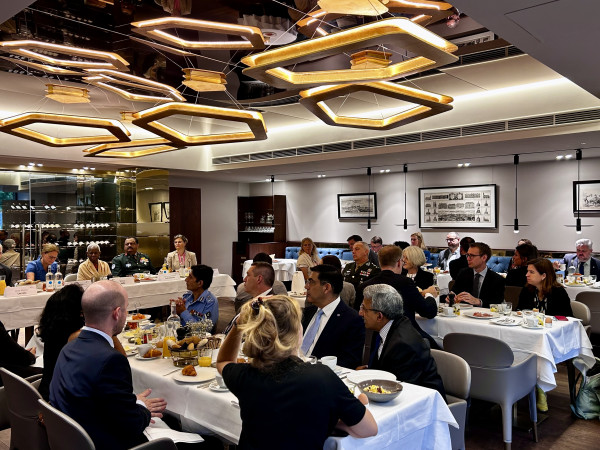SRSG-Breakfast 2025 - Making a Compelling Case for Peace (Operations)
 Copyright: ZIF
Copyright: ZIF
Strategic communication an important tool for peace operations
In mid-July, the heads of UN peacekeeping missions were guests in Berlin. The Federal Foreign Office almost “traditionally” invites UN peacekeeping leaders to a multi-day retreat in the summer.
ZIF participates in this retreat with its own format, the so-called SRSG Breakfast. This brings together heads of mission and other high-ranking UN decision-makers with representatives of the departments and the Berlin specialist community in an open exchange. This year, the topic of strategic communication was on the agenda on July 9.
Hybrid threats and disinformation increasing danger for missions
Since the first mandate was issued 77 years ago, UN peacekeeping operations have demonstrated their effectiveness and adaptability. The recent Ministerial Conference on UN Peacekeeping hosted by Germany also underlined the broad support that peace operations enjoy among member states. And yet missions are under considerable pressure: many of the environments in which they implement their mandate are characterized by internationalization, hybrid threats and rapid technological developments. Their international, national and local legitimacy and credibility are the greatest assets of peace operations and at the same time their greatest vulnerability. In recent years, the reputation of peace operations, their dependence on host state consent and their relationship with host communities have come under targeted attack. The most obvious example, but not the only one, is misinformation and disinformation that feeds on local grievances and twists them for political purposes.
In Africa, the region where the largest UN operations take place, including MONUSCO in the Democratic Republic of Congo and UNMISS in South Sudan, the number of disinformation campaigns almost quadrupled from 50 to 189 between 2022 and 2024. 60 percent of these came from external state actors - with Russia in the lead (around 40 percent).
High-level panel with perspectives from headquarters, Germany and operations
The panel participants - Jean-Pierre Lacroix, Under-Secretary-General for UN Peacekeeping Operations, Dr. Katharina Stasch, Director-General for International Order, United Nations and Arms Control and Federal Government Commissioner for Disarmament and Arms Control at the Federal Foreign Office, Bintou Keita, Special Representative of the United Nations Secretary-General for the Stabilization Mission in the DR Congo (MONUSCO) and Lieutenant General Mohan Subramanian, Commander of the UN Mission in the Republic of South Sudan (UNMISS) - emphasized the positive momentum of the Peacekeeping Ministerial and the Pact for the Future of September 2024 despite all challenges and called for forging alliances between global advocates of peace operations.
Germany has a crucial role to play
Germany's important role in maintaining momentum and supporting peace operations as a core instrument of the multilateral system was emphasized.
Strategic communication and success stories needed
Not least against the backdrop of increasing financial pressure and ongoing reforms and restructuring, it is all the more important to strengthen strategic communication and make a convincing case for peace and peace operations.
In the field, greater attention must also be paid to the daily ‘smaller’ successes that save thousands of lives and protect civilians. Even where political processes are lengthy and complicated, peace operations make a valuable contribution to stabilization and development.